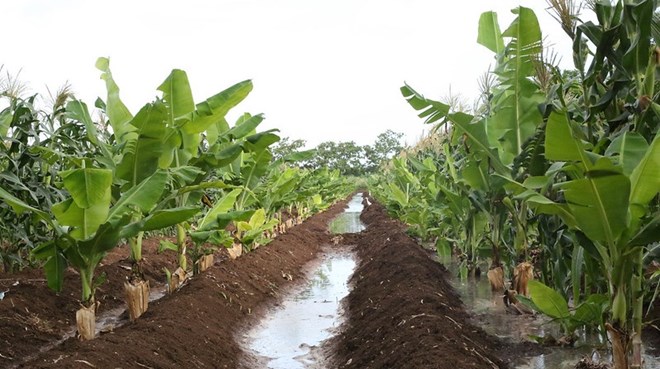Thursday September 7, 2023

Somalia relies considerably on agriculture, and many people depend on it for their livelihood. However, every government in any country endeavors to embrace the agriculture transformation initiative in a way that tackles hunger and poverty.
The adoption of modern agricultural technologies, including genetically modified seeds and crops, throughout the Green Revolution substantially impacted global agricultural productivity.
The improvement of productivity in agriculture, reduction of crop production costs, and accessibility of crops with higher quality and more efficiency have all been made possible by technological advancement in the agricultural sector.
Agriculture production involves growing crops, ensuring the availability of the means of agricultural production, and producing agricultural products such as grains, vegetables, fruits, meat, dairy products, pesticides, and animal husbandry.
Historically, the EU countries established the Common Agricultural Policy (CAP) in 1962, which is a program for agricultural transformation that aims, inter alia, to develop the agricultural sector, protect farmers' interests, ensure the availability of essential agricultural products in the markets of the EU, maintain environmental balance, support rural development, direct agricultural investments, and ensure reasonable prices are available to consumers.
Transformation in Agricultural production requires utilising natural resources like land, water, manure, and air, as well as technology, skilled labour, tools, and various novel agricultural approaches. However, due to its vast diversity, agricultural production is the main activity on which the worldwide economy depends.
Why is it time to act?
Somalia is recovering from three decades of unrest and conflict that severely hampered the country's socioeconomic development, including the agricultural sector. However, the country's declining agricultural sector growth contributed to rising food insecurity, constant economic volatility, and severe droughts.
Nevertheless, significant initiatives were made regarding the trajectory of state-building, the peace processes, governance, institutional revival and reforms through homegrown solutions, and regional and international partnerships.
As the battle against Al-Shabab is expected to end soon and the completion point of Somalia's HIPC initiative is fast approaching, the country ushers in a new era of becoming a debt-free nation and a free zone from terrorist groups.
Despite this, agriculture is the key to boosting the country's economy because so many natural resources need to be exploited. Approximately 98% of the country's land is untapped despite being exceptionally productive, arable, and suitable for cultivation.
Why does Somalia need agricultural transformation?
Undoubtedly, Somalia needs to transform its agricultural sector and move away from its conventional methods of the agriculture sector, promoting agribusiness sector opportunities. Agricultural transformation in the country is a relevant and vital necessity.
Many African nations, including Kenya, have launched measures to modernize their agricultural industries. Kenya's agricultural sector is regarded as one of the best in the world, not just in Africa. A large portion of the economy is influenced by agriculture, which employs 70% of the people.
Modern agricultural practices, cutting-edge agricultural technology, and novel agribusiness strategies will improve the nation's poor economic situation.
However, the external actors could contribute to the country's agricultural transformation, spur the flow of foreign direct investment, and, ultimately, lead to a boom in export and import activities.
To improve the country's transformation of agricultural production and attract foreign direct investment to foster economic development, the National Economic Council of Somalia (NEC) argues that it is essential to promote the reform, repurposing, and implementation of agricultural policy, farmer protection rights, and agribusiness regulations and rules.
The Way Forward
The transformation of the field of agriculture is vital for the sustainable development of every nation's economy. Nevertheless, Somalia is currently at a critical juncture in its pursuit of achieving food security and national economic development. Consequently, the following suggestions can help achieve agricultural transformation in Somalia and enable the nation to succeed in achieving food security and national economic development.
Increasing investment in agricultural infrastructure: To enhance the agricultural infrastructure—which includes the roads, drainage and irrigation systems, water storage facilities, and the transportation of agricultural products—investment and financial support for the sector is essential. This will reduce crop loss and contribute to enhancing farmers' access to markets.
Fostering modern agricultural inputs: To increase crop production and enhance quality, it is necessary to use modern agricultural inputs, such as genetically modified seeds, safe pesticides, and improved fertilizers.
Providing Training and Agricultural Education: Farmers should be provided training on how to manage their land and crops efficiently, as well as how to use sophisticated agricultural equipment. This will help farmers sharpen their skills and maximize the yield of their agricultural output.
Promoting environmental sustainability: Promoting agricultural environmentally friendly techniques like biodiversity preservation, organic farming, and efficient water resource management is critical. This will result in healthy soil and environmental preservation for future generations.
However, to address current challenges in the nation's agricultural sector, it is necessary for all stakeholders, including the public and private sectors, to cooperate and work together with the support of international partners.
Mustaf I. Ali
Somali researcher, passionate about, Agri-Food, Climate Change, State -Building and SDGs.
[email protected]


